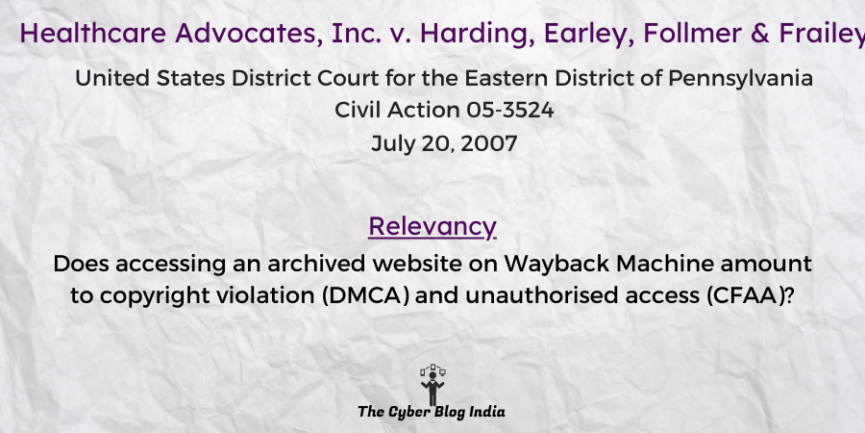Healthcare Advocates, Inc. v. Harding, Earley, Follmer & Frailey

Healthcare Advocates, Inc. v. Harding, Earley, Follmer & Frailey
497 F.Supp.2d 627
In the United States District Court for the Eastern District of Pennsylvania
Civil Action 05-3524
Before Senior District Judge R.F. Kelly
Decided on July 20, 2007
Relevancy of the Case: Does accessing an archived website on Wayback Machine amount to copyright violation (DMCA) and unauthorised access (CFAA)?
Statutes and Provisions Involved
- The Computer Fraud and Abuse Act, 18 U.S.C. § 1030
- The Digital Millenium Copyright Act, 17 U.S.C. § 101
Relevant Facts of the Case
- The plaintiff assists patients in dealing with their healthcare providers. In June 2003, the plaintiff filed a suit against a competitor for trademark infringement.
- The defendant was the competitor’s legal representative in the 2003 suit. During the pre-discovery stage, the defendant used a website called Wayback Machine to view the plaintiff’s website before the 2003 suit.
- Wayback Machine scans and takes screenshots of websites and archives them into a database. The defendant viewed and printed screenshots of the plaintiff’s website before 2003.
- On its website, the plaintiff implemented a security measure called robots.txt. This file prevents applications like Wayback Machine from archiving a website. If Wayback Machine creates an archive of a website after scanning a robots.txt file, it informs the application to deny public access to the website’s archive.
- When the defendant used Wayback Machine, the platform’s servers malfunctioned and showed archived screenshots of the plaintiff’s website.
- As a result, the plaintiff filed this suit against the defendant for copyright infringement for violating DMCA, CFAA, and state law claims for conversion and trespass.
Prominent Arguments by the Counsels
- The plaintiff’s counsel submitted that the plaintiff’s website was duly registered with the Copyright Office. By accessing the archived website on Wayback Machine, the defendant violated the provisions of DMCA by bypassing technical measures implemented by the plaintiff.
- The defendant’s counsel argued that using the plaintiff’s copyright was under the fair use policy. The primary purpose was to represent its client in the 2003 suit. Further, there was no public display. Moreover, he further submitted that the defendant did not decrypt, avoid, bypass, remove, deactivate, or impair the robots.txt file on the plaintiff’s website.
Opinion of the Bench
- The defendant’s use of the plaintiff’s copyright comes under the fair use doctrine. It is unreasonable to penalise the defendant for not preserving the cache files on their systems.
- Trying to access an archived website on Wayback Machine does not amount to bypassing technical measures. Moreover, the defendants could only access the archived website due to a server malfunction. Hence, the defendants are not in violation of CFAA.
- The federal law pre-empts the state law claims for conversion and trespass.
Final Decision
- The court dismissed the suit.
